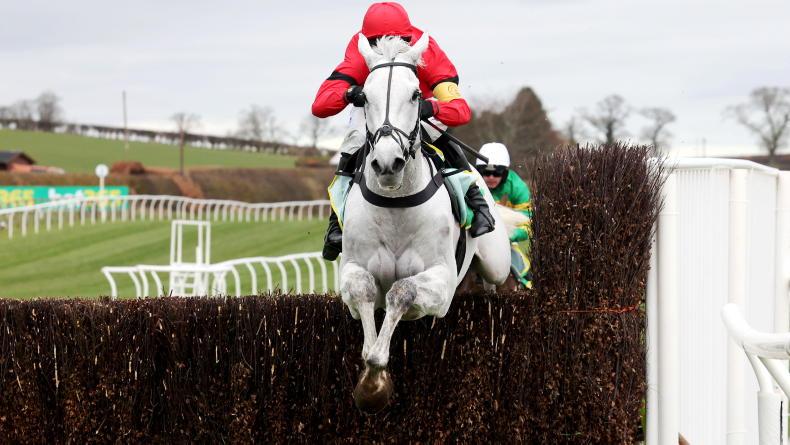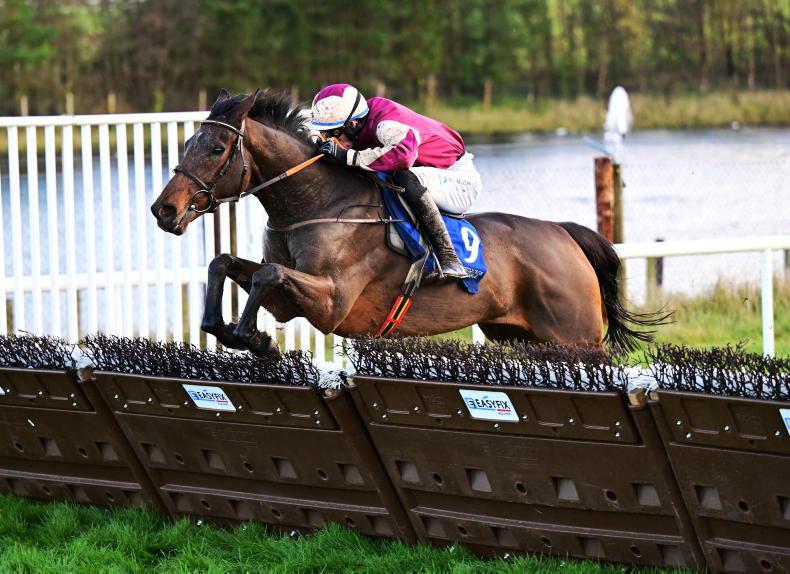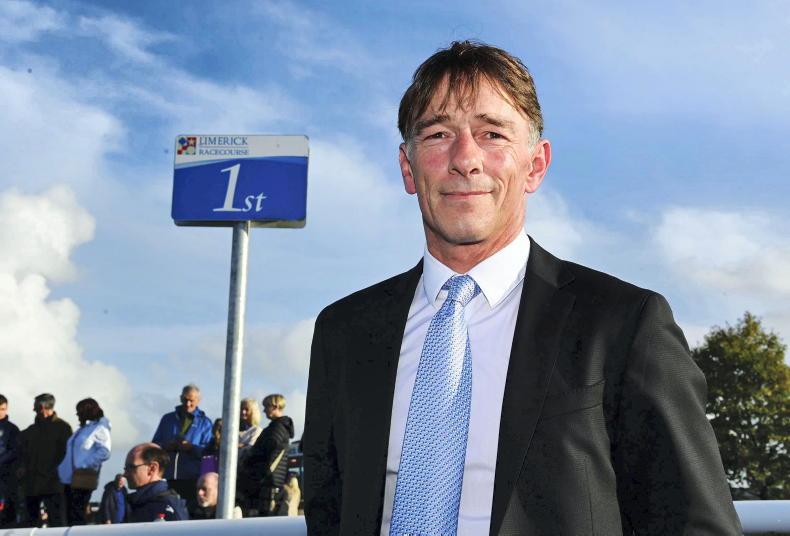IT’S often funny how things can work out in Irish racing. Limerick racecourse, in its latest and current guise, had its first ever meeting at Greenmount Park in 2001. Over 18,000 people attended the Munster National featured meeting at what was the first newly built racecourse in Ireland for over 60 years.
Tom Rudd was riding the favourite in the first race. A small piece of history up for grabs. The Michael O’Brien-trained Brendan Shine went close but not close enough, finishing third to Edward O’Grady’s Rain In Spain.
Not deterred, Rudd teamed up with O’Brien again with another favourite in the next, the even-money Regal Venture and this time he got the win, in a novice chase. Not quite the first ever winner at Greenmount Park but the first chase winner.
He laughs a little, reflecting back on it now.
“When I was walking in that day, I didn’t think I was going to be managing this place 20 years later!”
Actually, he freely admits himself, if you told him he’d be managing the racecourse at the start of this year, he’d have found it hard to believe, having spent the best part of 20 years working for Tattersalls and running his own sales consignment business with his wife Katie in Borris-In-Ossory, Co Laois. A lot of water has gone under the bridge since, for both Rudd and Limerick.
There is no doubt the latter has developed into one of the best tracks in Ireland, evidenced by a 18-meeting fixture list, a Christmas Festival that goes strength to strength and by the fact it is now Grade 1 jumps track via the Faugheen Novice Chase on St Stephen’s Day.
However, in recent seasons the track has gone through a bumpy period. Since Patrick O’Callaghan took over the reins as racecourse manager in 2017, Limerick has had four different managers, the same amount as Manchester United. That might be par for the course in the Premier League but not in Irish racing where stability and a clear strategy is necessary for a racecourse, not least during the last few years with everything that came from the pandemic.
Limerick has also garnered headlines for the wrong reasons. On the final day of their 2020 Christmas Festival, the Irish Stable Staff Association complained to the stewards after the racecourse failed to provide a hot meal to stable staff to purchase.
Then, seven months later, the course came under fire again for its treatment of owners, with Kevin O’Ryan going on a mini rampage live on Racing TV, revealing that owners had to knock on a window to get a meal out of a small hatch. O’Callaghan possibly didn’t handle that situation the best when O’Ryan revealed that his reply off air was: “What more do you want?”

When you’re arguing with owners or stable staff, you’re inevitably losing and it may have been the case that the Limerick board felt change was needed. Emma White agreed to take on the role after she was approached by the racecourse. Previously general manager at Sedgefield, she moved over from the north of England but lasted just four months in the position, which was a huge surprise.
Kilbeggan manager Paddy Dunican came in as an interim manager and now it’s over to Rudd, who has just completed his first full month in the job.
So how did it come about?
“They came looking for me,” Rudd reveals. “I didn’t necessarily want to be a racecourse manager but the board approached me, we had a chat, and I felt it was a nice challenge, a challenge I was up for having spent 20 years in the same job.
“It’s a big change, but I’ve been lucky enough in that I’ve been working in the industry for 35 years and I’ve worked all the way up from being a stable lad to an owner to a steward. I know what the racecourse wants, what the trainer wants, what the owner wants, what the stable staff want, what the jockey wants. It’s a hugely exciting to be in this position.”

Moneygall
Rudd is an native of Moneygall, Co Offaly, but moved to Laois shortly after he finished riding. His father was a pig farmer and founded Rudd’s, a familiar brand who produce meats for supermarkets around the country.
Growing up Tom has always had ponies. Hunting and Pony Club events took up any school holidays and at the age of 15, he left school to become a jockey. He rode for 15 years, most notably winning the 1999 Irish Grand National on Glebe Lad and the 2000 Galway Plate on Dovaly.
When he hung up his riding boots in 2001, he was approached by Tattersalls for a Bloodstock Executive role, and he proved to be a very popular member of the team in that sales company for two decades. He continues to act as a steward at different racecourses around the country and sits on numerous committees of the IHRB. Rudd also consigns horses for the sales at home. Some notable graduates that passed through his Busherstown Farm are Gelino Bello, Allegorie De Vassy, Galvin, Farouk D’Alene and Flic Ou Voyou.
In many ways, he was a surprise choice for the role, he even admits that himself, and it’s not exactly a straightforward one given Limerick’s criticisms.
“I think Limerick did get a bad reputation and I’m in here trying to fix it now,” Rudd says. “I’m still scratching my head; it’s not the facilities, it’s not the ground, the location couldn’t be better, the ground and maintenance staff are top class.
“But it seems like a section of trainers felt it wasn’t enjoyable to bring their owners here. That is not a knock on the managers here before me. Emma White tackled the problem straight away. She was integral in the decision to move the owners and trainers facility up to the fourth floor which has been a big positive for the track. Owners and trainers have an excellent balcony view and everyone seems happier with that.
“Patrick was here for 14 years in total (worked as a financial controller before taking up the manager role). Patrick brought in great sponsors, right up until he resigned from his position. He did a fabulous job.
“Patrick’s background was in accountancy and I suppose where we differ is that I guess I’m more of an industry person, having worked in so many sectors. Whether an industry person is going to make a huge difference compared to Patrick, I don’t know, but I’d be pretty sure I can make an impact.”
Independent
Limerick, like the majority of courses in Ireland, is independent, unlike the five Horse Racing Ireland-owned courses, so there is perhaps a greater pressure to deliver profits. The course has a well developed non-racing business, with Rudd outlining that the facility will host 16 different functions this month. Just last Sunday, over 18,000 attended the track for the Limerick Show, a family and agricultural festival.

On racedays, like most tracks, Limerick relies on its marquee fixtures for the big attendances. The four-day Christmas festival attracted over 40,000 people in 2019, the last festival before the pandemic, while Rudd expects 8,000 or so in for the Munster National meeting later this month.
The remainder days on the Limerick fixture list are a harder sell but the track has followed the lead of others and used a high-profile music act in Nathan Carter to play after racing in July. That attracted a decent crowd but Rudd says it’s not as simple as it seems.
“We had a lot of people come to see Nathan Carter but when we totted up the figures, I’d say we just about broke even. We had a lot of people come in after the second last race to see him.
“The main thing is you cover your costs. Of course you’re disappointed more people didn’t come in for the racing to enjoy both, but the main thing is you’re getting them in and maybe next time, they come and watch four races.
The media rights are are crucial, absolutely crucial - they keep racetracks afloat, and then anything through the gate is a bonus really.
“We can only do what we feel will bring in revenue and have it enjoyable for them. You have to weigh things up with an act - obviously you want a good act that people will want to come and see but that has to be measured against your profit and loss column.”
There are plenty of people out there that say racecourses should be letting people in for free, not just for the ‘industry’ meetings but for the majority of meetings. Rudd doesn’t agree, recalling a time he was working in Tattersalls and Fairyhouse had heavily advertised a free Wednesday fixture in the local area but nobody showed up.
“It’s a difficult one - I think if you offer something to someone for free, they have second thoughts, they’re wondering, why is it free? Maybe you’d be better offering €5 admission days instead. But I think first and foremost, you’re better off focusing on the racecourse experience.”
You can talk about music acts and free admission all the time, but it is without doubt that media rights payments are the biggest factor to any racecourse’s business. Racecourses receive about €40 million a year in payments under the current media rights deal, which ends at the end of this year.
Crucial
The next deal, needless to say, is crucial. At an Oireachtas Agriculture Committee meeting in July, HRI chief executive Suzanne Eade was challenged by senators who accused the governing body of abusing its position with regard to how much of the media rights payments it takes for itself as well as favouring the bigger tracks.
Such allegations were seemingly tipped to senators from smaller tracks, despite the Association of Irish Racecourses later standing over how the media rights were handled.

“A few tracks have gone semi rogue and want more media rights payments,” Rudd says. “But to be honest, I don’t fully yet know the ins and outs of it.
“If you take the likes of Leopardstown on their big days, whether it’s Irish Champions Weekend or their Christmas meeting, their betting turnover is bigger, their viewing is bigger, their sponsorship pool is bigger and they get a bigger cut (of media rights).
“The smaller tracks who might get bigger crowds during the year, the Ballinrobes and Kilbeggans, they wouldn’t necessarily have the same level of streaming of the bigger tracks and days and their overheads aren’t the same. It’s a difficult one for HRI, do you give the lesser tracks more? Do you take from the bigger tracks?
“It is a tricky one but at the end of the day there’s only three players looking for the media rights really. You’re talking about Sky betting, which is the bookmaker shops, and then you’ve got the two other racing channels. It would be nice to think there could be an outlier or two to challenge for a piece of our fabulous sport; Amazon Prime have recently entered the live sport broadcasting arena.
“The media rights are are crucial, absolutely crucial - they keep racetracks afloat, and then anything through the gate is a bonus really.
“The six-year deal is up now. We’re hoping and praying that it’s valued like it deserved to be valued. You can only watch live once.”
Negotiations on the deal are ongoing and an agreement is expected in the coming months.
You’d forgive Rudd for concentrating on his own matters in Limerick in the meantime with the track set to enter an important period of fixtures, starting with the Ladbrokes Munster National next month, which will, in another significant first for the track, be shown live on ITV alongside two other races.
A new jumps season and a new manager. Exciting times.
Winning the Irish Grand National on Glebe Lad
It was surreal, something that will be in the history books forever. I’d been trying for a few years before that. Actually the year before I broke my arm in the race on Glebe Lad’s brother Ontheroadagain. He was a good horse, he won the Ulster National but he couldn’t jump and he did a sommersault when we got to the fourth fence. So it was great to come back and win the race for the same owner/breeders Tom and Tim Conroy from Laois. It’s a special sporting event.
Letting racegoers in for free
I remember Fairyhouse had an industry day around 15 years ago and they sent fliers around to every household in the vicinity advertising free admission but nobody turned up. It’s a very difficult one. If you offer someone something for free, people often wonder, why is it free? Maybe you’d be better off charging a fiver.
I’m all for getting people through the gates, and of course the racecourse can get the benefit of that in order ways, but I’m not sure free admission is the way. I think the racecourse experience is more important.
Watering
We’re lucky in Limerick that we have a water supply in the middle of the track and it never runs dry. I think watering could easily be a big issue for racecourses going forward though.
You only have to look at Britain this summer. Councils have stopped racecourses watering in England. They’ve had to abandon racing over the last six weeks because they couldn’t water the track, the ground was firm. They may not be far away here either. Plus, in any case, it can be very costly to a racecourse.


 This is a subscriber-only article
This is a subscriber-only article
 It looks like you're browsing in private mode
It looks like you're browsing in private mode














SHARING OPTIONS: